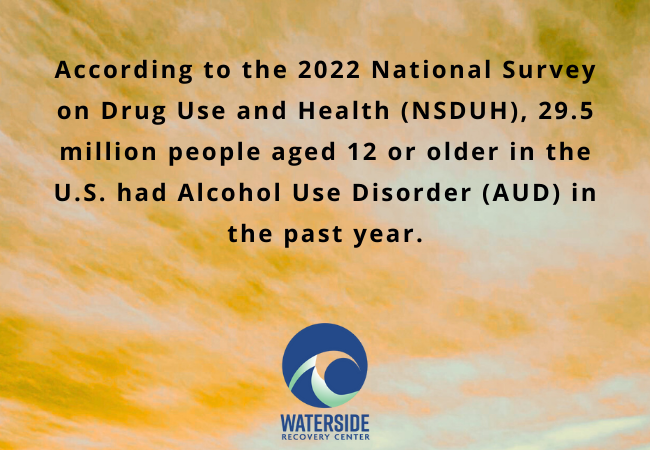Recovery from alcohol addiction is not a journey meant to be walked alone. While therapy, detox, and medical care are critical, support groups provide a unique form of healing that connects people through shared experience, mutual encouragement, and accountability. At Waterside Recovery, we integrate support groups into every level of our care—from our Day Treatment Program to our Outpatient Treatment Program in Massachusetts—because we know that connection is essential to lasting sobriety.
Whether someone is just beginning recovery or rebuilding after relapse, peer support is often the missing link that makes change sustainable.
Why Support Groups Matter in Alcohol Recovery
Alcohol addiction thrives in secrecy and isolation. Support groups break that pattern by offering:
- A safe, nonjudgmental space to share struggles
- Peer accountability
- Connection with others who “get it”
- Opportunities for mentorship and leadership
- Hope through shared success stories
Support groups remind clients that they are not alone, which can be transformative for someone dealing with shame, guilt, or fear.
At our Massachusetts Addiction Treatment Center, support groups are woven into our therapeutic approach to create a powerful recovery community.
Types of Support Groups in an Alcohol Addiction Treatment Program
Waterside Recovery offers various peer-led and clinician-facilitated support groups as part of our structured treatment plans. Common types include:
1. 12-Step Groups (AA-Inspired)
Based on the Alcoholics Anonymous model, 12-step groups focus on spiritual growth, self-inventory, amends, and helping others. These groups are ideal for individuals seeking structure and a long-established recovery framework.
2. Peer Process Groups
Facilitated by trained therapists, these groups create a safe setting to explore emotions, triggers, and behaviors through open dialogue and guided feedback from peers.
3. SMART Recovery
A science-based alternative to 12-step programs, SMART Recovery focuses on self-empowerment and tools for managing urges, thoughts, and behaviors.
4. Relapse Prevention Groups
Clients share real-life challenges and learn coping strategies in a collaborative environment. These groups are especially helpful during transition phases like moving from PHP to IOP or outpatient care.
How Support Groups Are Integrated into Our Programs
At Waterside Recovery, support groups complement individual therapy, medical services, and holistic care. Here’s how they fit into each level of care:
Day Treatment Program Massachusetts
- Clients participate in multiple support group sessions daily
- Groups focus on relapse prevention, emotional regulation, and early recovery tools
- Encourages strong peer bonding during the most intensive phase of treatment
Afternoon Treatment Program Massachusetts
- Offers flexibility for those balancing recovery with work or school
- Support groups in the afternoon provide continuity of care and a sense of community
Outpatient Treatment Program Massachusetts
- Maintains recovery momentum after PHP or IOP
- Weekly support groups focus on long-term goals, accountability, and managing life in sobriety
Each level of care reinforces the belief that community is recovery.
Benefits of Participating in Support Groups During Treatment
Support groups provide benefits that therapy alone cannot:
Emotional Validation
Hearing “me too” can be life-changing. Support groups help normalize the emotions, challenges, and setbacks of early recovery.
Accountability Through Peer Support
Knowing others are rooting for your success increases motivation and reduces the likelihood of relapse.
Safe Space to Practice Communication
Group settings allow clients to practice vulnerability, honesty, and boundary-setting—skills critical to rebuilding relationships outside of treatment.
Hope and Perspective
Meeting someone further along in recovery reminds newer clients that change is possible and sustainable.
Support Groups and Long-Term Sobriety
Numerous studies show that individuals who attend support groups regularly are significantly more likely to maintain long-term sobriety.
According to the National Institute on Drug Abuse (NIDA):
- Participation in peer support groups can reduce relapse risk by up to 30–40%
- Continued group involvement is associated with stronger recovery networks and improved mental health
This is why our Alcohol Addiction Treatment Program in Massachusetts not only introduces support groups early but also encourages clients to continue participating after treatment ends.
Breaking the Shame Cycle Through Group Connection
Shame is one of the most powerful barriers to recovery. Many individuals battling alcohol addiction believe they are “bad,” “weak,” or “unworthy” of help.
Support groups directly challenge that belief.
In a group setting, clients hear from others with similar stories—and they begin to realize:
-
They are not alone
-
Addiction is a condition, not a character flaw
-
Everyone has the capacity to change
This shared vulnerability breaks the cycle of isolation and shame, opening the door to real emotional healing. That’s why we integrate peer support even in early phases of our Day Treatment Program in Massachusetts.
Building Social and Emotional Skills in Group Settings
Recovery isn’t just about staying sober—it’s about rebuilding your life and relationships. Support groups are a perfect training ground for developing:
-
Healthy communication (expressing needs, resolving conflict)
-
Empathy and compassion for others
-
Listening skills and non-reactive responses
-
Self-reflection through feedback
-
Assertiveness and boundary-setting
At Waterside Recovery, our Afternoon Treatment Program in Massachusetts includes process groups that help clients strengthen these social muscles—so they feel prepared to reengage with their family, friends, and workplace.
The Role of Alumni Support Groups After Discharge
Healing doesn’t stop when formal treatment ends. That’s why we offer alumni support groups as part of our extended care planning.
Alumni groups provide:
-
Continued connection with peers and counselors
-
A judgment-free space to share post-treatment wins and struggles
-
Support for real-world challenges like parenting, employment, dating, and grief
-
Ongoing accountability and relapse prevention reinforcement
These groups are especially important for graduates of our Outpatient Treatment Program Massachusetts, helping them maintain motivation and connection well into long-term recovery.

Beyond Treatment: Transitioning to Community-Based Support
At Waterside Recovery, we help clients build a bridge from clinical treatment to lifelong recovery. As they complete our Addiction Treatment Center Massachusetts programs, we provide guidance and referrals for:
- Local Alcoholics Anonymous (AA) or SMART Recovery meetings
- Alumni support networks
- Sober living homes with group accountability
- Online or virtual peer support forums
We ensure that everyone leaves treatment with a clear plan to stay connected and supported.
Support Groups in Dual Diagnosis and Trauma Recovery
Clients facing co-occurring mental health conditions or past trauma benefit significantly from targeted support groups. At our center, we offer:
- Trauma survivor groups
- Women’s or men’s recovery circles
- Groups for anxiety or depression in recovery
- LGBTQ+-affirming peer groups
These focused spaces make recovery more inclusive and personalized—key values in our Drug Addiction Treatment Program Massachusetts and alcohol recovery pathways.
Real Stories of Healing Through Peer Support
Many clients at Waterside Recovery share how hesitant they were to speak in a group at first—but soon found it became their favorite part of the day. They describe how group support:
- Helped them open up for the first time
- Created friendships that lasted long after treatment
- Taught them to listen and support others, deepening their own healing
- Made them feel safe, seen, and strong
This transformation speaks to the power of shared experience.
Why Choose Waterside Recovery for Group-Integrated Treatment?
At Waterside Recovery, we don’t treat addiction in isolation—we treat the whole person through evidence-based care, emotional healing, and meaningful connection.
Here’s what makes our programs unique:
- Integrated support groups at every level of care
- Therapist-facilitated peer groups for safety and growth
- Customized options: 12-step, SMART, relapse prevention, trauma-focused
- Inclusive spaces for LGBTQ+ individuals, parents, veterans, and more
- Ongoing access to community-based support after discharge
- Programs built on trust, connection, and hope
We’re more than just an Alcohol Addiction Treatment Program Massachusetts—we’re a recovery community that begins with compassion and ends with confidence.
Conclusion
Overcoming alcohol addiction takes more than willpower—it takes connection. At Waterside Recovery, support groups are more than meetings—they’re lifelines. They offer a space to be heard, to feel understood, and to rediscover the strength you never thought you had.
From your first day in treatment to life beyond our programs, group support surrounds you with people who get it. People who won’t judge you. People who will walk beside you through the hardest moments—and celebrate your greatest breakthroughs. You don’t have to do this alone. Join a recovery community that believes in the power of shared healing and helps you build a sober, supported life. Call us today at 866.671.8620 to start your recovery journey with the strength of community behind you.
FAQ on Groups in an Alcohol Addiction Treatment Program
What is the purpose of support groups in alcohol addiction treatment?
Support groups offer emotional connection, shared experience, and peer accountability, helping individuals feel less isolated and more empowered in their recovery journey.
Are support groups part of every treatment level at Waterside Recovery?
Yes. Whether you’re in our Day Treatment, Afternoon Program, or Outpatient level of care, support groups are a central component of your recovery plan.
What types of support groups are available?
We offer a variety of group types including 12-step-based groups, SMART Recovery, relapse prevention groups, trauma-informed peer groups, and alumni circles.
How do support groups differ from therapy?
Support groups focus on peer connection and shared experience, while therapy (individual or group) is facilitated by a licensed clinician and often addresses deeper emotional or psychological issues.
Can I attend support groups after completing my treatment?
Absolutely. We offer alumni support groups and help clients transition to community-based options like AA, SMART Recovery, or other sober networks to maintain connection post-treatment.
Are support groups confidential?
Yes. Waterside Recovery maintains strict confidentiality within all support group settings, creating a safe space for open and honest sharing.
How do support groups help prevent relapse?
By fostering connection, accountability, and daily motivation, support groups help clients stay engaged, recognize triggers, and seek help before a relapse occurs.
Are there specialized groups for dual diagnosis or trauma?
Yes. We offer specialized support groups for individuals dealing with co-occurring mental health issues, trauma recovery, and identity-based needs (e.g., LGBTQ+-affirming groups).
What if I’m not comfortable speaking in a group?
Many people feel nervous at first, and that’s okay. You’re encouraged to listen until you’re ready to share. Most clients grow to find support groups their favorite part of treatment.


